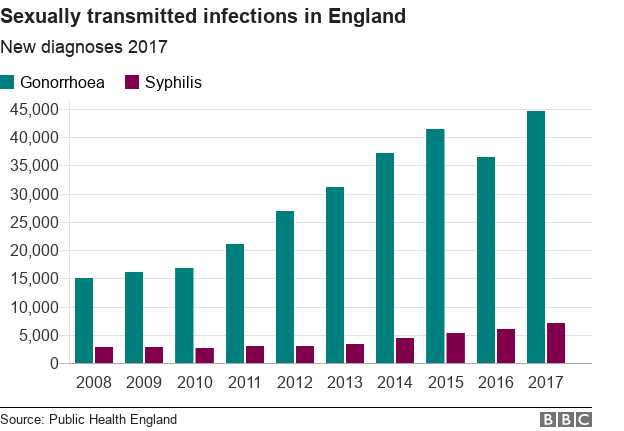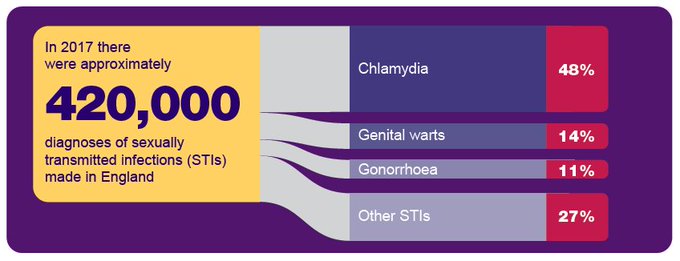 GETTY IMAGES
GETTY IMAGES
England has continued to see a rise in cases of syphilis and gonorrhoea over the past year.
New data shows a 20% increase in cases of syphilis and a 22% increase in gonorrhoea, compared with 2016.
Diagnoses of sexually transmitted infections (STIs) in England remain stable overall, with around the same number reported as the previous year.
Health experts have expressed concern over a decline in testing for chlamydia.

The impact of STIs remains greatest in young people aged between 15 and 24 years, with gay, bisexual and other men who have sex with men among those most at risk, says Public Health England in its report.
Black and minority ethnic populations are also disproportionately affected by STIs.
Chlamydia remains the most prevalent of the diseases, accounting for more than 200,000 cases last year - nearly half (48%) of all new STI diagnoses in 2017.
Testing in contraceptive clinics has fallen by 61% since 2015, which experts say may indicate a squeeze on resources. However, it may also reflect a rise in the use of home testing kits - and the availability of testing in other settings.
More than 7,000 cases of syphilis and nearly 46,000 cases of gonorrhoea were reported to Public Health England in 2017.
 SCIENCE PHOTO LIBRARY
SCIENCE PHOTO LIBRARY
The rise in syphilis follows a 10-year trend, with three-quarters of new diagnoses in gay, bisexual and other men who have sex with men.
Health professionals have expressed concern at the rise of gonorrhoea and the threat of super-gonorrhoea, a rare but emerging strain that is resistant to routine drug treatment.
In March, the first case of super-gonorrhoea was detected in the UK, in a man who is thought to have caught the infection having sex abroad in South East Asia.
Two "similar" cases were subsequently discovered in Australia, suggesting that super-gonorrhoea may become more common in the future.
Debbie Laycock, from the Terrence Higgins Trust, said: "Our sexual health services are stretched too thinly and demand outweighs availability, with more cuts already planned.
"The significant rise in both syphilis and gonorrhoea shows why further cuts are completely unacceptable and would be extremely damaging, particularly given the emergence of a new extensively drug-resistant strain of gonorrhoea."
Meanwhile, a significant fall in rates of genital warts - a 90% decrease on 2009 - reflects the widespread take-up of the Human Papilloma Virus vaccine in girls aged 12-13.
Last December, Public Health England (PHE) launched a sexual health campaign aimed at promoting condom use among young people.
Dr Gwenda Hughes from PHE said: "Consistent and correct condom use with new and casual partners is the best defence against STIs, and if you are at risk, regular check-ups are essential to enable early diagnosis and treatment."


0 التعليقات: